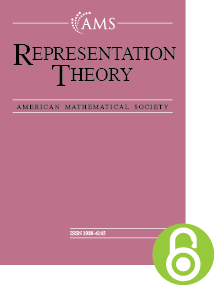Positivity conjectures for Kazhdan-Lusztig theory on twisted involutions: the universal case
HTML articles powered by AMS MathViewer
- by Eric Marberg
- Represent. Theory 18 (2014), 88-116
- DOI: https://doi.org/10.1090/S1088-4165-2014-00452-7
- Published electronically: May 6, 2014
- PDF | Request permission
Abstract:
Let $(W,S)$ be a Coxeter system and let $w \mapsto w^*$ be an involution of $W$ which preserves the set of simple generators $S$. Lusztig and Vogan have recently shown that the set of twisted involutions (i.e., elements $w \in W$ with $w^{-1} = w^*$) naturally generates a module of the Hecke algebra of $(W,S)$ with two distinguished bases. The transition matrix between these bases defines a family of polynomials $P^\sigma _{y,w}$ which one can view as “twisted” analogues of the much-studied Kazhdan-Lusztig polynomials of $(W,S)$. The polynomials $P^\sigma _{y,w}$ can have negative coefficients, but display several conjectural positivity properties of interest. This paper reviews Lusztig’s construction and then proves three such positivity properties for Coxeter systems which are universal (i.e., having no braids relations), generalizing previous work of Dyer. Our methods are entirely combinatorial and elementary, in contrast to the geometric arguments employed by Lusztig and Vogan to prove similar positivity conjectures for crystallographic Coxeter systems.References
Bibliographic Information
- Eric Marberg
- Affiliation: Department of Mathematics, Stanford University, Stanford, California 94305
- Email: emarberg@stanford.edu
- Received by editor(s): March 13, 2013
- Received by editor(s) in revised form: September 18, 2013
- Published electronically: May 6, 2014
- © Copyright 2014 American Mathematical Society
- Journal: Represent. Theory 18 (2014), 88-116
- MSC (2010): Primary 20C08; Secondary 05E15
- DOI: https://doi.org/10.1090/S1088-4165-2014-00452-7
- MathSciNet review: 3200665


